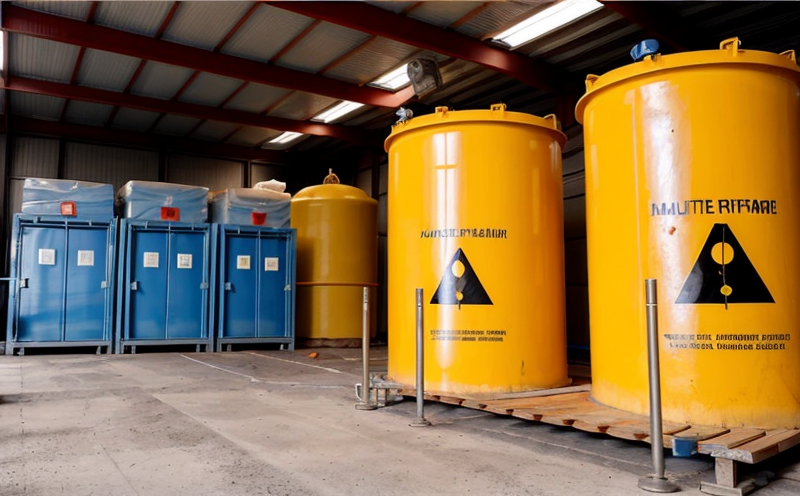
-
Consumer Product Safety-
Certification for Safety in Hazardous Materials-
Certification for Safe Handling of Radioactive Materials
We provide comprehensive solutions designed to help our clients mitigate risks, enhance performance, and excel in key areas such as quality, health & safety, environmental sustainability, and social responsibility.
Discover
For many years, our organization has been operating successfully, boasting modern laboratories that meet international standards. These laboratories are equipped with the latest technology devices and equipment, and we have built a strong team of experienced and trained personnel to operate them.
DiscoverWelcome to Eurolab, your partner in pioneering solutions that encompass every facet of life. We are committed to delivering comprehensive Assurance, Testing, Inspection, and Certification services, empowering our global clientele with the ultimate confidence in their products and processes.
Discover
-
Consumer Product Safety-
Certification for Safety in Hazardous Materials-
Certification for Safe Handling of Radioactive MaterialsCertification for Safe Handling of Radioactive Materials: A Comprehensive Guide
The safe handling of radioactive materials requires specialized training and expertise to ensure that individuals can work safely in environments where radiation exposure may occur. Certification programs are designed to equip personnel with the knowledge, skills, and competencies needed to handle radioactive materials without compromising safety or security.
Why is Certification Important?
Certification for safe handling of radioactive materials is crucial for several reasons:
Protection of Human Life: Radioactive materials can be hazardous if not handled properly. Certification ensures that individuals have received adequate training on how to minimize radiation exposure and respond to emergency situations.
Prevention of Accidents: Untrained personnel may unintentionally cause accidents or contamination, compromising safety and security. Certification verifies that personnel are familiar with standard operating procedures (SOPs) and regulations governing the handling of radioactive materials.
Compliance with Regulations: Regulatory bodies require personnel involved in the handling of radioactive materials to undergo certification training. Non-compliance can result in fines, penalties, or even suspension of operations.
Key Aspects of Certification Programs
Certification programs for safe handling of radioactive materials typically cover the following areas:
Radiation Fundamentals: Understanding radiation principles, types of radiation (alpha, beta, gamma), and basic measurement techniques.
Safety Procedures: Familiarization with SOPs, emergency response plans, and radiation monitoring equipment.
Personal Protective Equipment (PPE): Training on the use of PPE to minimize radiation exposure, including dosimeters, gloves, and aprons.
Regulatory Compliance: Overview of relevant regulations, such as those governing nuclear safety, transportation, and waste management.
Detailed Information about Certification Programs
Some key aspects of certification programs for safe handling of radioactive materials are:

Healthcare and Medical Devices
The Evolution of Healthcare and Medical Devices: Trends, Innovations, and Challenges The healthcare...

Automotive Compliance and Certification
Automotive Compliance and Certification: Ensuring Safety and Efficiency The automotive industry is ...

Chemical Safety and Certification
Chemical safety and certification are critical in ensuring the safe management of products and proce...

Food Safety and Testing
Food Safety and Testing: Ensuring the Quality of Our Food As consumers, we expect our food to be sa...

Aviation and Aerospace Testing
Aviation and Aerospace Testing: Ensuring Safety and Efficiency The aviation and aerospace industr...

Product and Retail Standards
Product and Retail Standards: Ensuring Quality and Safety for Consumers In todays competitive marke...

Railway Industry Compliance
Railway Industry Compliance: Ensuring Safety and Efficiency The railway industry is a critical comp...

MDR Testing and Compliance
MDR Testing and Compliance: A Comprehensive Guide The Medical Device Regulation (MDR) is a comprehe...

Hospitality and Tourism Certification
Hospitality and Tourism Certification: Unlocking Opportunities in the Industry The hospitality and ...

Pharmaceutical Compliance
Pharmaceutical compliance refers to the adherence of pharmaceutical companies and organizations to l...

Trade and Government Regulations
Trade and government regulations play a vital role in shaping the global economy. These regulations ...

Cosmetic Product Testing
The Complex World of Cosmetic Product Testing The cosmetics industry is a multi-billion-dollar ma...

Energy and Sustainability Standards
In today’s rapidly evolving world, businesses face increasing pressure to meet global energy a...

Pressure Vessels and Installations Testing
Pressure Vessels and Installations Testing Pressure vessels are a critical component of various ind...

Agricultural Equipment Certification
Agricultural equipment certification is a process that ensures agricultural machinery meets specific...

Battery Testing and Safety
Battery Testing and Safety: A Comprehensive Guide As technology continues to advance, battery-power...

Lighting and Optical Device Testing
Lighting and Optical Device Testing: Ensuring Performance and Safety Lighting and optical devices a...

Electromechanical Safety Certification
Electromechanical Safety Certification: Ensuring Compliance and Protecting Lives In todays intercon...

Environmental Simulation Testing
Environmental Simulation Testing: A Comprehensive Guide In todays world, where technology is rapidl...

Industrial Equipment Certification
Industrial equipment certification is a critical process that ensures industrial equipment meets spe...

Electrical and Electromagnetic Testing
Electrical and Electromagnetic Testing: A Comprehensive Guide Introduction Electrical and electrom...

Environmental Impact Assessment
Environmental Impact Assessment: A Comprehensive Guide Environmental Impact Assessment (EIA) is a c...

IT and Data Center Certification
IT and Data Center Certification: Understanding the Importance and Benefits The field of Informatio...

NEBS and Telecommunication Standards
Network Equipment Building System (NEBS) and Telecommunication Standards The Network Equipment Bu...

Military Equipment Standards
Military Equipment Standards: Ensuring Effectiveness and Safety The use of military equipment is a ...

Consumer Product Safety
Consumer Product Safety: Protecting Consumers from Harmful Products As a consumer, you have the rig...

Construction and Engineering Compliance
Construction and Engineering Compliance: Ensuring Safety, Quality, and Regulatory Adherence In the ...

Renewable Energy Testing and Standards
Renewable Energy Testing and Standards: Ensuring a Sustainable Future The world is rapidly transiti...

Fire Safety and Prevention Standards
Fire Safety and Prevention Standards: Protecting Lives and Property Fire safety and prevention stan...

Transportation and Logistics Certification
Transportation and Logistics Certification: A Comprehensive Guide The transportation and logistics ...